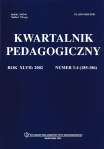MORALNOŚĆ A KSZTAŁCENIE. O ICH PROBLEMATYCZNYM STOSUNKU W GRECKIEJ PAIDEI I W NOWOŻYTNEJ TEORII KSZTAŁCENIA
MORALITY AND EDUCATION. ON THEIR PROBLEMATIC RELATION IN THE GREEK PAIDEIA AND IN THE MODERN TIMES THEORY OF EDUCATION
Author(s): Dietrich BennerSubject(s): Education
Published by: Wydawnictwa Uniwersytetu Warszawskiego
Keywords: edukacja moralna; negatywne uczenie moralności; etyka eksperymentalna
Summary/Abstract: In this article, the relationship between morality and education is analysed, with particular attention paid to the challenge posed by modernity to pedagogy with respect to moral education. The author carries out the analysis on two levels simultaneously. The first of this is of the nature of historical retrospection, the subject of which are the views of selected philosophers and pedagogues. First of all, the positions of Plato and Aristotle (antiquity) are considered, after there are Rousseau nad Kant (the modern breakthrough in thinking), and then Herbart’s theory of aesthetic-ethical judgements and Schleiermacher’s complementary theory of pedagogical action. This is followed by Kohlberg and Oser’s conception (modernity), and finally Benner’s own proposal. Speaking briefly, this concerns the possibility of transmitting (education) of morality with the aid of an experimental ethics which builds on negative experience. The second thread is complementary to the historical outline and shows the continuous development of philosophical and pedagogical reflection on moral education. Against this background, the contemporary scepticism over the need and possibility of moral education is clearly evident. The author wrestles with these doubts. The course of his reasoning is not, however, the consequence of affirmative (yes) or non-affirmative (no) positions, but rather the consequence of a pertinent discussion with the aforementioned thinkers. The resulting conclusions have been presented at the end in eight points, which syntetically summarise the program of reflective education of the individual leadership in moral judgements (conscience).
Journal: Kwartalnik Pedagogiczny
- Issue Year: 213/2008
- Issue No: 3
- Page Range: 69-100
- Page Count: 32
- Language: Polish
- Content File-PDF

